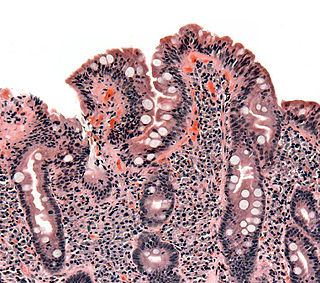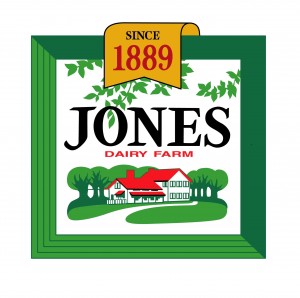A service club or service organization is a voluntary nonprofit organization where members meet regularly to perform charitable works either by direct hands-on efforts or by raising money for other organizations. A service club is defined firstly by its service mission and secondly by its membership benefits, such as social occasions, networking, and personal growth opportunities that encourage involvement.

Coeliac disease or celiac disease is a long-term autoimmune disorder, primarily affecting the small intestine, where individuals develop intolerance to gluten, present in foods such as wheat, rye and barley. Classic symptoms include gastrointestinal problems such as chronic diarrhoea, abdominal distention, malabsorption, loss of appetite, and among children failure to grow normally. Non-classic symptoms are more common, especially in people older than two years. There may be mild or absent gastrointestinal symptoms, a wide number of symptoms involving any part of the body, or no obvious symptoms. Coeliac disease was first described in childhood; however, it may develop at any age. It is associated with other autoimmune diseases, such as Type 1 diabetes mellitus and Hashimoto's thyroiditis, among others.

United Way is an international network of over 1,800 local nonprofit fundraising affiliates. Prior to 2015, United Way was the largest nonprofit organization in the United States by donations from the public.

A stomach rumble, also known as a bowel sound, peristaltic sound, abdominal sound, bubble gut or borborygmus, is a rumbling, growling or gurgling noise produced by movement of the contents of the gastrointestinal tract as they are propelled through the small intestine by a series of muscle contractions called peristalsis. A trained healthcare provider can listen to these intestinal noises with a stethoscope, but they may be audible enough to be heard with the naked ear as the fluid and gas move forward in the intestines. The lack of bowel sounds is indicative of ileus, intestinal obstruction, or some other serious pathology.
The United Nations Association of the United States of America (UNA-USA) is a nonprofit grassroots organization dedicated to promoting political and public support for the United Nations among Americans. It is a program of the United Nations Foundation. Its mission includes advocating for greater U.S. leadership at the UN, improving and enhancing the UN system, and implementing the Sustainable Development Goals and the UN Charter in both the U.S. and globally.

Fundraising or fund-raising is the process of seeking and gathering voluntary financial contributions by engaging individuals, businesses, charitable foundations, or governmental agencies. Although fundraising typically refers to efforts to gather money for non-profit organizations, it is sometimes used to refer to the identification and solicitation of investors or other sources of capital for for-profit enterprises.

The Law School Admission Council (LSAC) is a nonprofit organization whose members include more than 200 law schools throughout the United States, Canada and Australia. Its headquarters are in Newtown, Pennsylvania.

The Freecycle Network (TFN) is a private, nonprofit organization registered in Arizona, US and is a charity in the United Kingdom. TFN coordinates a worldwide network of "gifting" groups to divert reusable goods from landfills. The network provides a worldwide online registry, organizing the creation of local groups and forums for individuals and nonprofits to offer free items for reuse or recycling and to promote a gift economy. In contrast, although flea markets and swap meets also contribute to the 3 Rs, they involve mainly buying and selling or bartering rather than gifting.
DEBRA is the name of an international medical research charity dedicated to securing effective drug treatments and ultimately cures for every type of epidermolysis bullosa, with national groups in over 40 countries including in the United Kingdom and the United States.

Gliadin is a class of proteins present in wheat and several other cereals within the grass genus Triticum. Gliadins, which are a component of gluten, are essential for giving bread the ability to rise properly during baking. Gliadins and glutenins are the two main components of the gluten fraction of the wheat seed. This gluten is found in products such as wheat flour. Gluten is split about evenly between the gliadins and glutenins, although there are variations found in different sources.
The following outline is provided as an overview of and topical guide to autism:
The Alzheimer's Association is a nonprofit voluntary health organization that focuses on Alzheimer's disease care, support and research.

The Association of the United States Army (AUSA) is a private, non-profit organization that serves as the professional association of the United States Army. Founded in 1950, it has 121 chapters worldwide. Membership is open to everyone, not just Army personnel, nor is membership mandatory for soldiers. The organization publishes ARMY Magazine and the Green Book. The current president is retired Army General Robert Brooks Brown.

Gluten-related disorders is the term for the diseases triggered by gluten, including celiac disease (CD), non-celiac gluten sensitivity (NCGS), gluten ataxia, dermatitis herpetiformis (DH) and wheat allergy. The umbrella category has also been referred to as gluten intolerance, though a multi-disciplinary physician-led study, based in part on the 2011 International Coeliac Disease Symposium, concluded that the use of this term should be avoided due to a lack of specificity.
Gluten-sensitive enteropathy–associated conditions are comorbidities or complications of gluten-related gastrointestinal distress. GSE has key symptoms typically restricted to the bowel and associated tissues; however, there are a wide variety of associated conditions. These include bowel disorders, eosinophilic gastroenteritis and increase with coeliac disease (CD) severity. With some early onset and a large percentage of late onset disease, other disorders appear prior to the coeliac diagnosis or allergic-like responses markedly increased in GSE. Many of these disorders persist on a strict gluten-free diet, and are thus independent of coeliac disease after triggering. For example, autoimmune thyroiditis is a common finding with GSE.

Microvillus inclusion disease, previously known as Davidson's disease, congenital microvillus atrophy and, less specifically, microvillus atrophy, is a rare genetic disorder of the small intestine that is inherited in an autosomal recessive pattern.

Jones Dairy Farm is an American, privately owned food company that produces a series of meat products, including breakfast sausage, ham, Canadian bacon, breakfast bacon, scrapple, and liver sausage. The company was established in 1889. The Jones family has owned and operated the business since its establishment by Milo C. Jones.
Chaitan Khosla is an Indian-born American biochemist who is the Wells H. Rauser and Harold M. Petiprin Professor of Chemical Engineering and Chemistry at Stanford University. He earned his B.Tech. in chemical engineering from Indian Institute of Technology Bombay in 1985 and his Ph.D. from the California Institute of Technology in 1990 with Jay Bailey working on the expression of the Vitreoscilla Hemoglobin gene. He did his postdoctoral work at the John Innes Centre with David Hopwood. He has been a professor at Stanford since 1992 and was the chair of the program. His research is focused on two realms, the first are to build a molecular understanding of polyketide synthases and the second is focused on the biochemistry of celiac disease particularly involving tissue transglutaminase. His group play a large role in identifying the role of the α2-gliadin fragment in immune responses.

Alessio Fasano is an Italian-born medical doctor, pediatric gastroenterologist and researcher. He currently holds many roles, including professor of pediatrics at Harvard Medical School and professor of nutrition at Harvard T.H. Chan School of Public Health, both in Boston. He serves as director of the Center for Celiac Research and Treatment at MassGeneral Hospital for Children (MGHfC) and co-director of the Harvard Medical School Celiac Research Program. In addition, he is director of the Mucosal Immunology and Biology Research Center at MGHfC, where he oversees a research program with approximately 50 scientists and staff researching a variety of acute and chronic inflammatory diseases, including cystic fibrosis, celiac disease, enteric infections and necrotizing enterocolitis. A common theme of these programs is the study of the emerging role of the gut microbiome in health and disease. Fasano is also the scientific director of the European Biomedical Research Institute of Salerno (EBRIS) in Italy. Along with these leadership positions, he is a practicing outpatient clinician in pediatric gastroenterology and nutrition and the division chief.











